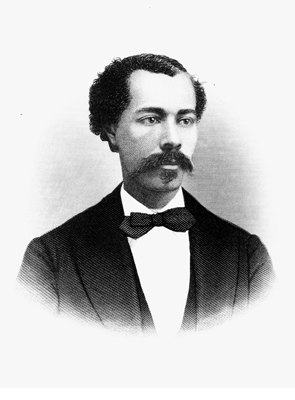
Black History, Government
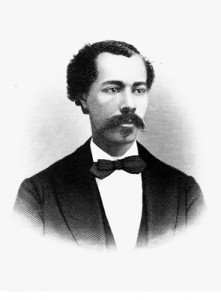
Representative, 1873-1877, Republican from Mississippi
Representative, 1882-1883, Republican from Mississippi
The only African-American Representative from Mississippi for a century, following a quick rise in politics at a young age, John Roy Lynch fought to maintain Republican hegemony in his state in the face of violent Democratic opposition. A veteran of the Civil War and, later, the Spanish-American War, Lynch emphasized his rights as an American citizen on the House Floor.
“It is certainly known by southern as well as northern men that the colored people of this country are thoroughly American,” he declared. “Born and raised upon American soil and under the influence of American institutions; not American citizens by adoption, but by birth.” (more…)
Black History, Government
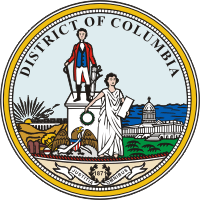 The District of Columbia, which became the nation’s capital in 1791, was by 1862 a city of contrasts: a thriving center for slavery and the slave trade, and a hub of anti-slavery activity among abolitionists of all colors. Members of Congress represented states in which slavery was the backbone of the economy, and those in which slavery was illegal.
The District of Columbia, which became the nation’s capital in 1791, was by 1862 a city of contrasts: a thriving center for slavery and the slave trade, and a hub of anti-slavery activity among abolitionists of all colors. Members of Congress represented states in which slavery was the backbone of the economy, and those in which slavery was illegal.
One result of the intense struggle over slavery was the DC Compensated Emancipation Act of 1862, passed by the Congress and signed by President Abraham Lincoln. The act ended slavery in Washington, DC, freed 3,100 individuals, reimbursed those who had legally owned them and offered the newly freed women and men money to emigrate. It is this legislation, and the courage and struggle of those who fought to make it a reality, that we commemorate every April 16, DC Emancipation Day.
Though the Compensated Emancipation Act was an important legal and symbolic victory, it was part of a larger struggle over the meaning and practice of freedom and citizenship. These two words continue to be central to what it means to be a participating member of society. We invite you to think about what these concepts have meant in the past and what they mean to you today.
by Mayor Vincent C. Gray
Black History, Government
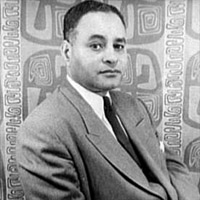
Ralph Bunche
Bunche was the first black person to win the Nobel Peace Prize, awarded in 1950. Born in Detroit, Michigan, Bunche and his sister were orphaned in 1915 and reared by their grandmother in Los Angeles. A brilliant, industrious student, Bunche graduated from Jefferson High School in 1922 as class valedictorian but was barred from the honor society because of his race.
In 1927, Bunche graduated from the University of California at Los Angeles, where he had excelled both in and outside the classroom. He wrote for the school newspaper, won oratorical contests, was sports editor of the yearbook, played guard for three years on the basketball team, and became Phi Beta Kappa. He then entered Harvard University, where in 1934 he became the first African American to earn a Ph.D. in government and international relations. (more…)
Black History, Government
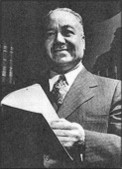
Irwin C Mollison
Irwin C Mollison (Born 1898) appointed judge of the US Customs Court. With his appointment on November 3, 1945, Judge Mollison was the first African American appointed to a position in the federal judiciary that was posthumously converted into an Article III judgeship. Judge Mollison was also the first African American to serve on the United States Customs Court. He was appointed by President Truman.
Black History, Government
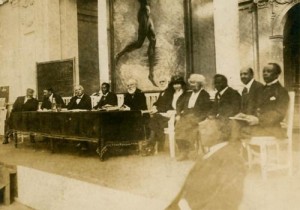
Speakers at The Pan African Congress,. Brussels, Belgium,1921
In 1919, the first Pan-African Congress was organized by W. E. B. Du Bois. There were 57 delegates representing 15 countries, a smaller number than originally intended because British and American governments refused to issue passports ro their citizens who planned on attending.[1] Their main task was petitioning the Versailles Peace Conference which was held in Paris at that time. Among their demands were that:
- The Allies should be in charge of the administration of former territories in Africa as a Condominium on behalf of the Africans who were living there.
- Africa be granted home rule and Africans should take part in governing their countries as fast as their development permits until at some specified time in the future.
The problem was that colonist offered no end in sight. Hence, the resistance and war pursued.
Black History, Government
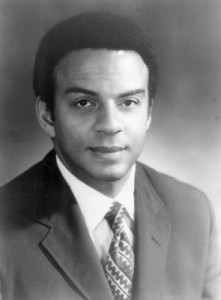
Andrew Jackson Young, Jr
A senior aide to Martin Luther King, Jr., in the Southern Christian Leadership Conference (SCLC) during the 1960s, Andrew Young had a meditative temperament that shaped his views as a proponent of nonviolent resistance. By the time he was sworn in to Congress in 1973, Young was committed to bringing King’s vision of civil rights to the nation and the world.1 His experiences in the grass-roots politics of the civil rights movement, combined with his diplomatic perspective and attitude, allowed Young to take principled but pragmatic stands for his constituents.
Andrew Jackson Young, Jr., was born in New Orleans, Louisiana, to Andrew and Daisy Fuller Young. His father was a dentist and his mother was a schoolteacher. (more…)






